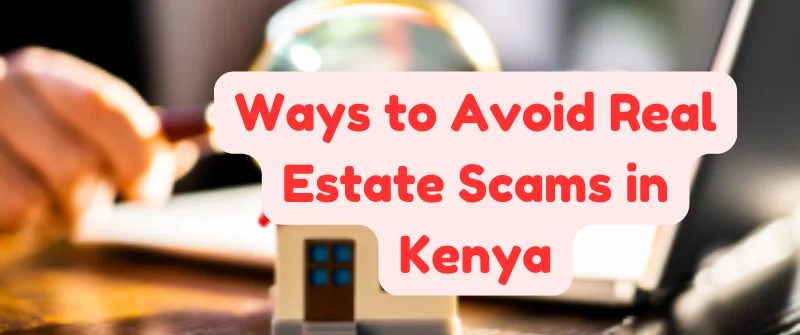Kenya’s real estate market has grown massively in recent years. More people invest in land and properties, hoping to secure financial stability or build dream homes. However, with this growth, real estate scams have also risen.
This guide will equip you with the tools to identify red flags, conduct proper checks, and safeguard your hard-earned money from real estate scams.
Understanding Common Types of Real Estate Scams
Like any other industry in Kenya, the real estate is not proof of scams. Scams are everywhere, and everyone needs to be on the look out.
For example, in the digital currency, Kenyans were reported to have lost $120 million to cryptocurrency scams in 2021 alone. This is something to put you into alert whenever you want to invest.
In real estate, one needs to be careful and vigilant. In that light, you must understand scammers’ common tactics to avoid being a victim.
1. Fake Title Deeds

Title deeds are the ultimate proof of property ownership, but scammers know how to forge them. These documents may look genuine, but they’re sophisticated fakes.
Buyers often realize they’ve been duped when it’s too late, especially after discovering the land they purchased doesn’t legally belong to them.
How to protect yourself:
Always verify the title deed with the Ministry of Lands. They can confirm its authenticity and match the details with the registered owner.
2. Phantom Land or Properties
In these scams, fraudsters “sell” land or houses that don’t exist or belong to someone else. They’ll take you to a random plot, show you fabricated maps, and even offer fake documents to convince you. Once you pay, they disappear.
Example:
Jane paid Ksh. 1.5 million for a piece of land in Kitengela. When she returned to start construction, she discovered the land belonged to someone else.
3. Double Sales
This is when scammers sell the exact property to multiple buyers. Each buyer believes they own the property until disputes arise. These scams thrive because many buyers fail to conduct thorough checks.
Warning: If you hear stories of multiple parties claiming the same land, avoid the deal immediately.
4. Impersonation Fraud
Scammers sometimes pose as the legitimate property owner, using fake IDs or stolen documents. They may even provide fake phone numbers or addresses to appear credible.
Tip: Insist on meeting the property owner in person and cross-check their identification documents.
Signs of a Potential Real Estate Scam

Spotting red flags early can save you from falling into a trap.
1. Unrealistic Prices
Deals that seem too good to be true often are. For example, if the average land cost in an area is Ksh. 2 million per acre and someone offers it at Ksh. 800,000, ask why.
Scammers use low prices to lure buyers quickly.
2. High-Pressure Tactics
Fraudsters often create a false sense of urgency, claiming another buyer is ready to purchase if you delay. This is meant to pressure you into paying without proper checks.
3. Lack of Documentation
Legitimate sellers are transparent. If someone avoids showing critical documents like the title deed or refuses to share their identification, that’s a huge red flag.
4. Vague Ownership Claims
Some sellers cannot explain how they acquired the property or why they’re selling it. If they cannot provide a clear ownership history, walk away.
The Importance of Conducting Due Diligence
Due diligence is your first line of defense against scams. Have a guide that will lead you in the whole process of buying land in the Kenyan market.

Title Deed Verification
Visit the Ministry of Lands to confirm the title deed is genuine. This process will reveal the actual owner and any disputes tied to the property.
Land Search Process
Conducting a land search can help uncover hidden problems, such as unpaid loans, liens, or disputes. It’s a simple but powerful step to save you from major headaches.
Surveyor Involvement
Hire a licensed surveyor to confirm the land’s boundaries and location. They’ll help you avoid buying land that doesn’t match the seller’s description.
The Role of Legal Professionals
A property lawyer is an essential partner in any real estate transaction. They help ensure all processes are legitimate and secure.
Hiring a Property Lawyer
Your lawyer will review the title deed and draft contracts and guide you through the transfer process. Their expertise ensures that everything is noticed.
Drafting a Sale Agreement
A sale agreement should clearly state the terms of the purchase. It protects you from future disputes and holds the seller accountable for their promises.
Verification of Transfers
Ownership is official once the transfer process is complete. Your lawyer will confirm this step is done before you make full payment.
Dealing Only with Reputable Agents and Developers
Trust is everything when dealing with agents or developers.
Checking Registration
Verify that your agent is registered with the Estate Agents Registration Board (EARB). This ensures they operate under the law.

Researching Track Records
Look into the agent’s or developer’s reputation. Check for reviews, testimonials, and previous projects to gauge their credibility.
Avoiding Unlicensed Middlemen
Unregistered brokers often lack accountability. They may disappear after collecting their commission, leaving you with unresolved issues.
Avoiding Payment Pitfalls
How and when you pay for property matters considerably.
Using Secure Payment Channels
Avoid cash payments, which leave no paper trail. Opt for bank transfers or cheques for added security.
Avoiding Upfront Payments
Don’t pay large sums until you’ve verified ownership and received proper documentation.
Getting Receipts and Documentation
Keep detailed records of every transaction. Receipts provide evidence if disputes arise.
Red Flags in Property Listings

Some property ads are designed to deceive buyers. Here are some red flags in property listings.
Vague Descriptions
Listings without details like plot size, features, or location are often scams. Always ask for clarity.
Unclear Locations
If the property’s location isn’t specific, insist on a site visit. Never buy property you haven’t seen.
Too Many Conditions
Sellers who restrict viewings or inspections may have something to hide.
Staying Informed on Current Scams
Real estate scams evolve, so staying updated is critical.
Keeping Up with News
Follow news reports about new fraud tactics in the real estate market.
Consulting Experienced Buyers
Learn from people who’ve successfully navigated property purchases. Their experiences can guide you.
Joining Online Communities
Participate in forums where buyers share tips and advice. These platforms are great for staying informed.
The Role of Patience in Avoiding Scams
Please don’t rush into deals, no matter how tempting they seem.
Avoiding Impulsive Decisions
Take your time to review every aspect of the property. Scammers thrive on rushed decisions.
Taking Time to Verify
Thoroughly check all documents, visit the site, and consult professionals before committing.
What to Do If You’ve Been Scammed
If you become a victim, act quickly to minimize your losses.
Reporting to Authorities
File a report with the police or the Ethics and Anti-Corruption Commission (EACC). Provide all evidence you have.
Seeking Legal Recourse
A property lawyer can guide you through recovering your money or property.
Learning from the Experience
Use the experience to protect yourself in future transactions. If you feel comfortable, share your experience on social media to enlighten others.
11 Pitfalls to Avoid When Buying Land in Kenya
Buying land in Kenya is a significant investment. It’s exciting, but it’s also easy to make mistakes. Some mistakes can cost you a lot of money or even your land. To help you avoid trouble, here are 11 common pitfalls and how to avoid them.
1. Ignoring Due Diligence

Due diligence is the process of checking everything before buying land. Many people skip this step and regret it later.
For example, they don’t check if the title deed is actual or verify who owns the land. Some buyers must also check for unpaid loans or disputes tied to the land.
What to do:
Visit the Ministry of Lands and conduct a search to confirm ownership. Check for encumbrances, such as debts or court cases.
2. Falling for Scams and Fraud
Scammers are everywhere. They can use fake title deeds to trick you. Others sell land that doesn’t exist. Some even pretend to be the landowners when they’re not.
What to do:
Always meet the actual owner and verify their identity. Double-check all documents with the Ministry of Lands. If a deal seems suspicious, walk away.
3. Not Inspecting the Land Physically
Pictures can be deceiving. Many buyers skip visiting the land only to find problems later.
You might discover the land is swampy, rocky, or difficult to access. Some buyers also face disputes over boundaries because they didn’t inspect the land.
What to do:
Visit the land yourself. Walk around it, check the terrain, and ensure the boundaries match the description in the documents.
4. Overlooking Zoning and Land Designation
The land has specific uses. Some land is for farming, while others are for residential or commercial purposes. Buying land for the wrong use can lead to trouble.
For example, you might face restrictions if you buy agricultural land but plan to build a house. Future development plans, such as roads or factories, can also affect your land.
What to do:
Check the zoning and land designation with local authorities. Make sure the land fits your intended use.
5. Trusting Verbal Agreements
A verbal promise means nothing in land transactions. Without proper documentation, you have no legal protection.
Some sellers might promise to fix issues after the sale but never follow through. Without a written agreement, you can’t hold them accountable.
What to do:
Always have a written sale agreement. Include all terms, conditions, and promises in the contract.
6. Falling for Unrealistic Deals
Cheap land is tempting, but it’s often too good to be true. Scammers use low prices to lure buyers. Hidden costs like legal fees, stamp duty, or surveys can also surprise you.
What to do:
Be cautious of unusually low prices. Investigate why the land is cheap, and consider all costs before committing to the purchase.
7. Failing to Secure the Land After Purchase
Your work isn’t done after buying land. If you don’t secure it, squatters or neighbors might infringe on it. Some buyers delay transferring the title deed, leaving it in the seller’s name.
What to do:
Fence the land immediately after buying it. Visit it regularly to monitor any activity. Ensure the title deed is transferred to your name without delay.
8. Relying Solely on Agents
Agents or brokers can help you find land, but not all are trustworthy. Some give false information or cut deals with scammers.
Relying on an agent with your research is safe. They might overlook important details or prioritize their commission over your interests.
What to do:
Work with registered agents. Verify their credentials and track record. Do your research to confirm the land’s details.
9. Ignoring Location-Specific Risks
The location of the land matters. Some areas have high crime rates or poor infrastructure. Land in such places might seem affordable but difficult to develop or live on.
What to do:
Research the area’s security, accessibility, and availability of water, electricity, and roads. Speak to locals to get a clear picture of the location.
10. Rushing the Process

Buying land requires patience. Rushing can lead to poor decisions and missed details. Many buyers skip legal advice or necessary checks because they’re in a hurry.
What to do:
Take your time. Verify all documents, consult a lawyer, and don’t let anyone pressure you into a quick decision.
11. Not Following All the Steps
Land transactions involve several steps. Skipping even one can cause problems later. For example, failing to register the transaction with the Ministry of Lands can make it invalid.
What to do:
Follow every step, from searching to signing the sale agreement and registering the transaction. Work with a lawyer to ensure nothing is missed.
Wrapping Up
Real estate scams in Kenya are a real threat, but with the proper precautions, you can avoid them. Always verify documents, involve professionals, and conduct thorough research before committing to any deal.
A safe investment starts with knowledge and vigilance. Remember, patience and due diligence are your best friends in real estate.



